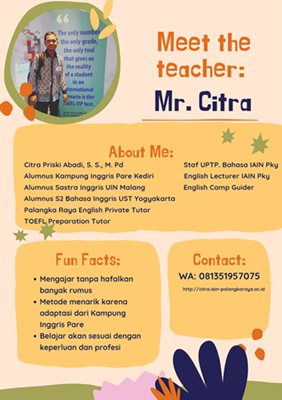Home »
» Research on Teaching English Reading Comprehension (Sources)
Research on Teaching English Reading Comprehension (Sources)

- Best Practices for Teaching Reading; What Award, Winning Classroom Teachers Do, Corwin Press, Randi Stone, 2008
- Collaborative Strategies for Teaching Reading Comprehension by Judi Moreillon 2009
- Comprehension Strategies for English Language Learners 30 Research-Based Reading Strategies , Margaret Bouchard
- Conceptual Foundations of Teaching Reading Solving Problems in the Teaching of Literacy by Mark Sadoski 2004
- Developing Reading and Writing in Second Language Learners_ Lessons from the Report, Diane August, Timothy Shanahan, 2008
- English L2 Reading Getting to the Bottom by Barbara M. Birch ESL and Applied Linguistics Professional Series 2002
- Explaining Reading, Second Edition; A Resource for Teaching Concepts, Skills, and Strategies, Gerald G. Duffy EdD, 2009
- Handbook of College Reading and Study Strategy Research First Edition, Inc, Rona F. Flippo and David C. Caverly, 2000
- Learning toTeach Reading by Dr Geoffrey R Roberts 1999
- Reading and Learning Difficulties Approaches to Teaching and Assessment Peter Westwood 2002
- Reading Between the Lines; Improve Your Scores on English and Social Studies Tests, Barbara Dallon, Wendy Ratner, 2007
- Reading Comprehension, Second Edition; Strategies for Independent Learners, Camille Blachowicz, Donna Ogle, 2008
- Reading in a Second Language; Moving from Theory to Practice Cambridge Applied Linguistics, William Grabe, 2008
- Reading Rules! Motivating Teens to Read, Libraries Unlimited, Elizabeth Knowles, Martha Smith, 2001
- Reading Success for Struggling Adolescent Learners by Susan Lenski and Jill Lewis The Guilford Press 2008
- Readings in Second Language Pedagogy and Second Language Acquisition; In Japanese Context, Asako Yoshitomi, 2006
- Research Based Methods of Reading Instruction, Grades K-4, Sylvia Linan-Thompson, Sharon Vaughn, 2007
- Research-Based Methods Of Reading Instruction, Grades K-3, Sharon Vaughn, Sylvia Linan-Thompson, 2004
- Silence in Second Language Learning; A Psychoanalytic Reading (Second Language Acquisition, Colette A. Granger, 2004
- Starting With Comprehension; Reading Strategies For The Youngest Learners, Andie Cunningham, Ruth Shagoury, 2005
- Teaching and Learning; The Essential Readings, Charles Desforges, Richard Fox, 2002
- Teaching Beginning Reading and Writing With the Picture Word Inductive Model by Emily F. Calhoun 1999
- Teaching ESL EFL Reading and Writing Esl Applied Linguistics Professional I.S.P. Nation 2008
- Teaching Reading and Writing A Guidebook for Tutoring and Remediating Students by Andrew P. Johnson 2008
- Teaching Reading Comprehension to Students with Learning Difficulties by Janette K. Klingner PhD, 2007
- Teaching Reading in Small Groups, Differentiated Instruction for Building Strategic, Heinemann, Jennifer Serravallo, 2010
- Teaching Reading to English Language Learners; Insights from Linguistics, Kristin Lems, Leah D. Miller, 2009
- Teaching Reading; Effective Schools, Accomplished Teachers, Barbara M. Taylor, P. David Pearson, 2002
- Teaching Secondary English Readings and Applications 2nd ed by Daniel Sheridan 2001
- Techniques and Resources in Teaching Reading, Volume 8-Oxford University Press, Sandra Silberstein, 1994
- The Guided Reader to Teaching and Learning, Routledge, Denis Hayes, 2010
- The Learning and Teaching of Reading and Writing by Naomi Flynn, Rhona Stainthorp 2006
- Understanding Advanced Second-Language Reading, Routledge, Elizabeth B. Bernhardt, 2010
- Ways of Reading; Advanced Reading Skills for Students of English Literature, Routledge, M. Montgomery, 2006
- What Teachers Need to Know About Reading and Writing Difficulties by Peter Westwood 2008
- You Gotta Be the Book Teaching Engaged and Reflective Reading With Adolescents by Jeffrey D. Wilhelm 1997

 home
home

 Home
Home
The effectiveness of IEEE Project Domains depends very much on the situation in which they are applied. In order to further improve IEEE Final Year Project Domains practices we need to explicitly describe and utilise our knowledge about software domains of software engineering Final Year Project Domains for CSE technologies. This paper suggests a modelling formalism for supporting systematic reuse of software engineering technologies during planning of software projects and improvement programmes in Project Centers in Chennai for CSE.
ReplyDeleteSoftware management seeks for decision support to identify technologies like JavaScript that meet best the goals and characteristics of a software project or improvement programme. JavaScript Training in Chennai Accessible experiences and repositories that effectively guide that technology selection are still lacking.
Aim of technology domain analysis is to describe the class of context situations (e.g., kinds of JavaScript software projects) in which a software engineering technology JavaScript Training in Chennai can be applied successfully